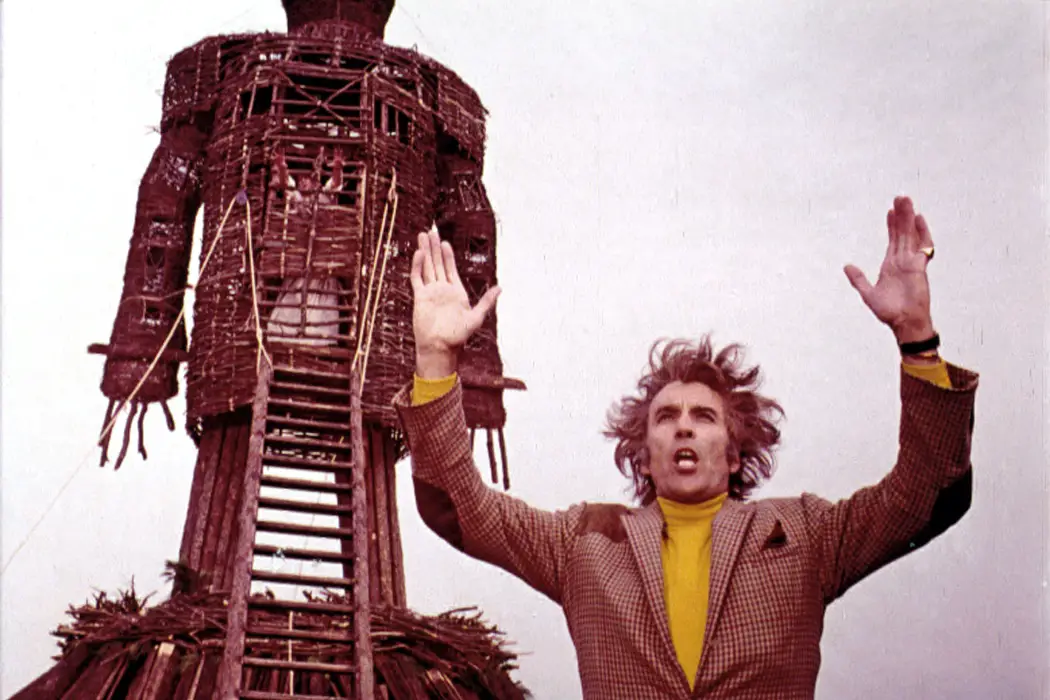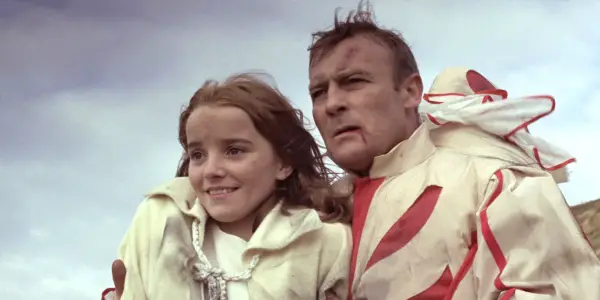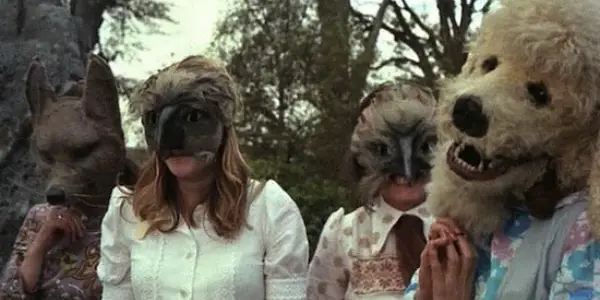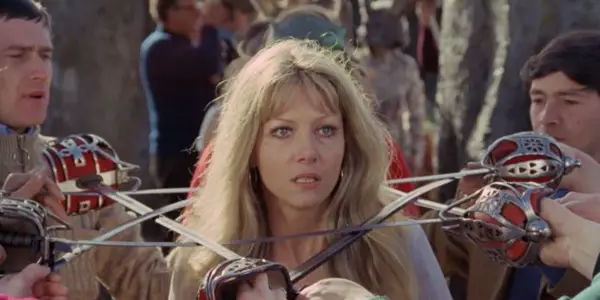Horrific Inquiry: THE WICKER MAN (1973)

Stephanie Archer is 39 year old film fanatic living in…
Welcome back to the newest, and at times goriest, column here at Film Inquiry: Horrific Inquiry. Twice a month, I will be tackling all things horror, bringing two films back into the spotlight to terrify and frighten once more. And occasionally looking at those that could have pushed the envelope further. Join us as we dive deep into the heart of horror, but warning, there will be spoilers.
In 2019, Ari Aster blew our minds with the quietly explosive horror film Midsommer. It was pensive and multi-layered, taking the cohesive unity of a community and religion to examine grief and loneliness. There was so much to the film, so much so that several watches lends itself to deeper meanings and new perspectives. An undeniable classic within modern horror, Midsommer is not a film easily forgotten.
It was this film that came to mind as I was scrolling through my Twitter account one evening, images of a man trapped within a wooden sculpture capturing my eye. As the fire was engulfing the wooden man and its prisoner within, I found myself thinking back to the ending of Midsommer, images of the man trapped within the bear suit burning inside the tent-like structure filling my mind. Was there a connection, or was this seemingly ritualistic imagery just that commonplace?
As I read through the synopsis of Robin Hardy’s The Wicker Man, my interest continued to peak as the similarities between the two films only seemed to grow stronger. And with harvest season upon us, it seemed the perfect time to dive into this critically acclaimed horror classic.
Ensuring the Perfect Harvest
As The Wicker Man opens, viewers are given a sweeping look at the waters and landscape of the Scottish isles. Accompanying this naturalistic viewpoint are the sounds of Scottish-influenced music, almost a shanty-sounding construction to the song. Abruptly, however, the song ends and a more modern 1970s sound takes hold, giving the film its first contrast between perceived ancient vs. modernization. This film will continually play into this concept, toying with the idea of ancient and modern through its depiction of religion vs. the occult, one that will challenge the notions of what ancient and modern really is.

The Wicker Man is in no rush to reach its destination, moving with the speed the wind will take it, giving audiences time to take in the grandeur of the cliff sides and the ocean views presented. From the very beginning, the idea of nature is front and center, reinforcing the beliefs of those who inhabit the island. This is swiftly contrasted by the rigidness of the manmade construction represented by the plane gliding through the air, further contrasted by the rigidness of the officer inside. On strict business to the island, Sergeant Howie (Edward Woodward) has arrived after receiving an anonymous letter expressing concern over a missing child. While others move at their pace and try to push early on the authority of the island (culminating into the supreme authority of Lord Summerisle ie. Christopher Lee), the Sergeant pushes forward given his right as an officer and a Christian.
As Sergeant Howie walks through the town beginning his investigation, he is met with silent resolve and unified front – no one has ever seen the girl. And while his search proves unfruitful, it is the presumed depravity on the island that begins to garner his attention. Having requested a place to sleep and a meal at the local inn, he is met by a community orgy outside after dark, followed by an enticing display for the landlord’s daughter Willow (Britt Ekland) to betray his virginity and vow to his Lord.
Judgment and Tolerance
While The Wicker Man may be a warning to those who choose a depraved life of paganism and the occult, there is a strange sense of tolerance that rises between the lines of judgment and damnation. As Sergeant Howie arrives, a stranger to the town, it is his way of life that is the true compass. Through his lens, he sees the sins of the islanders. Having turned their back on the church and the ministry, the islanders have returned to praising nature, offering sacrifices for a bountiful harvest and honoring the naturalism around and within them. As the Sergeant immediately decries, their way of living is ungodly.

While they never put the officer down for his beliefs, calmly and openly explaining their way of life, the Sergeant is quick to deliver judgment. He calls them out for their behavior and depravity, becoming almost consumed, his need to find the lost girl evolving into a form of redemption for himself and for the island. If he can save just one of them, there is the chance to save all.
Yet, while one boasts more tolerance than others, they are each blinded by their faith – willing to do all that is necessary to fulfill what is asked and needed of them. Where the cop will constantly call out wrongdoings in an attempt to lead others to the true God, the islanders are willing to make the ultimate sacrifice in the belief it will bode a bountiful harvest. Each is ruled by the expectations of their religion and their loyalty in faith with little question of what is asked of them.
In the end, is there religion or a belief that is more correct than the other? No. The Wicker Man puts religion itself under the microscope, examining the willingness of humanity to forfeit their individual line of thought in the face of the unexplained. When disaster strikes both personally or universally, faith is a solid foundation we can turn to for comfort, for an explanation, and for a path to forgiveness. For the cop, it is his belief in the sanctity of the Lord that not only prevents him from dipping into the pool of sin, but also gives him a sense of superiority from those around him. For the islanders, it is the sacrifice that will heal their bond with nature, returning to them the harvest they did not receive the year before.

But it is not only the blind faith that it examines but also the strength and support of the community it provides. For the cop, as the fires swirl around him in his final moments, he is able to find strength and comfort in the belief that his Lord will keep and protect him, opening the gates to Heaven. This belief is quietly reinforced by the community he shares his faith with back home, that continually reinforce his beliefs, and who are sure to pray for his soul when he does not return. For the islanders, their beliefs run through each of them, allowing for the shared experience of love, lust, and strength. You see this in the orgy scene, not even darkness is able to break their bonds. This is only further seen in the film’s ending as they sing and dance with one another in a shared exuberance for the success of their sacrifice and promise of a better future.
Conclusion: The Wicker Man
The Wicker Man was not entirely what I had expected, bordering along the lines of a horror musical (though nothing The Rocky Horror Picture or Anna and the Apocalypse). Its ending is impactful and memorable, but the lead-up to its conclusion leaves a bit to be desired. While a critically acclaimed horror film that would have an impact on the films to follow, its overall effect does not stand the test of time. If I hadn’t known the ending going in I wonder if it would hit differently, if the reveal at the film’s climax would have had a greater impact.
Though the film is not without its merits, remains a vital piece of not only horror but cinematic history. In its final moments, as the flames engulf the wicker man and the camera pulls away into the sky, almost like a god departing satisfied with the offering, audiences are left in awe of the conclusion – the presumed “good” failing to survive. In the end, we are all left wondering who really was the fool.
Have you seen The Wicker Man? What are your thoughts? Let us know in the comments below!
Watch The Wicker Man
Does content like this matter to you?
Become a Member and support film journalism. Unlock access to all of Film Inquiry`s great articles. Join a community of like-minded readers who are passionate about cinema - get access to our private members Network, give back to independent filmmakers, and more.













